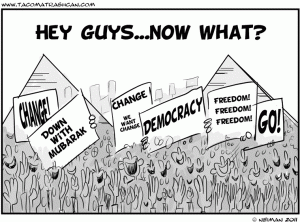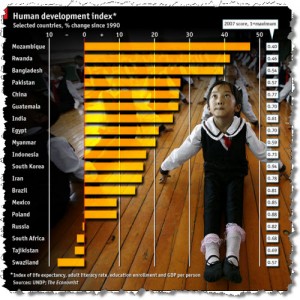Posts from — February 2012
Should I read this book or not?
Many people try and avoid wasting time on a non-so-worthwhile book by reading book reviews online, and checking out the top book lists, bestsellers. More often than not, we are persuaded by the number of copies sold, or by the many stars beside the book’s name in a magazine. Of course, with the widespread interest in choosing “the one” book, there will be many standards as well for measuring their merits or demerits.
One of the most well-known measures is of course that of the New York Times Bestseller list. The list is known to represent the popularity of print books including that of “independent book retailers; national, regional and local chains; online and multimedia entertainment retailers; supermarkets, university, gift and discount department stores; and newsstands”. As for e-books, online vendors are being evaluated. It is therefore a seemingly very comprehensive method of measurement when it includes a variety of sales venues. However, there is always a catch.
“Titles are included regardless of whether they are published in both print and electronic formats or just one format”. Of course, the problem is of double counting, since many books allow for alternative format once one format is bought by a consumer. Another big problem is that “among the categories not actively tracked at this time are: perennial sellers, required classroom reading, textbooks, reference and test preparation guides, journals, workbooks, calorie counters, shopping guides, comics, crossword puzzles and self-published books”. A lot of times, these categories account for more copies sold than retail. Is that a fair accurate exclusion? I think not.
Another problem with the methodology of data collection is that it is done in confidentiality between publishers, and is reported by a third party accounting services called Royalty Share. On the official website of the New York Times Bestsellers list, there is no detailed mention of the exact methodology used. The company claims it is a trade secret. The credibility of these ratings is definitely questionable due to possible conflict of interests and backdeals that may exist due to this lack of transparency.
With the success of the New York Times Bestsellers list, comes the inevitable want to overcome its success by its competitors. Another bestsellers list that exists is that of the Globe and Mail Bestsellers list.
“The weekly fiction (hardcover and paper) and non-fiction (hardcover and paper) lists are complied by the Globe and Mail using sales figures provided by BookNet Canada’s national sales tracking service, BNC SalesData, and from bookstores across Canada”. Seemingly, all bestsellers list hire third party tracking services to conduct the survey work. Little is said about the methodology used to obtain the information and categorize the books, unfortunately. The credibility of these bestsellers list seem to be based on the renown media influence of the company itself.
However, with the arbitrary categorization, the lack of transparency in the methodology of data collection, and the unjustifiable exclusion of certain vending methods (like that of wholesale, and educational purposes), it seems that the data obtained is inconclusive. I would recommend instead, reading the book reviews of the top 100 lists, and decide for yourself. Check the first link below for an example. I recommend it since they are ranked in no particular order, with a variety of genres to choose from, which seems more credible and unbiased. Enjoy!
http://www.theglobeandmail.com/news/arts/books/the-globe-100-the-very-best-of-2011/article2248133/
Sources:
http://www.theglobeandmail.com/news/arts/books/bestsellers/
http://www.nytimes.com/best-sellers-books/overview.html
http://www.iblist.com/list_by_rating.php?type=book
http://www2.macleans.ca/2011/12/08/review-maclean’s-top-20-books-of-2011/
February 23, 2012 1 Comment
The Birthplace of Democracy is dead
Greece, being the birthplace of democracy, may well have become an undemocratic state with the recent bailout and the tension that exists between democracy and sovereignty.
As an article stated, “Tuesday’s bailout takes another such step by protecting the European Central Bank from taking losses on its Greek bonds, while forcing private bondholders to take losses of as much as 70% in net present value”. With the finance industry being protected at the expense of sovereignty, it is understandable that one would suspect that the intentions of the government have deviated from the common good for the people. Greece has been placed under control of the International Monetary Fund, the European Central Bank and European Commission. There are disciplines, surveillances, sanctions and punishments that are placed on the nation as a whole.
If a nation acts on behalf of corporate interests and is dominated by third party interests, like that of Greece, it seems that the democracy is inexistent. The question at the heart of this quandary is whether democracy requires full sovereignty. It is without doubt that this element is not satisfied in Greece’s situation.
http://online.wsj.com/article/SB10001424052970204909104577236982261339566.html
February 22, 2012 No Comments
Welcome to the age of the data shadow.
A very vital element of democracy is that everyone is entitled to freedom of speech and expression. Many of us have heard on the news that Bill C-30 is the most daunting piece of legislation that will lead to the vanishing of so-called internet liberty. It is without doubt that Bill C-30 would threaten the fundamental civil liberty that guarantees democracy. However, little did we know that the government already has a lot of private information in their hands.
The term “data shadow” refers to the shadow that follows you in your daily activities. The article poignantly points out, “From tracking your movement with automated licence plate readers to attaching a name to your face in a crowd using biometric recognition of driver’s licence photos; from bureaucrats and politicians reading your health records to police analyzing your income and spending habits, if push came to shove, the information on you in the government’s reach is immense”.
For example, on the financial side of things, there is “enormous databanks of the Financial Transactions and Reports Analysis Centre of Canada (FinTRAC), a government agency collecting and disclosing information on suspected money laundering and terrorist financing”. It is with a lot of opposition and efforts spent did the Legal industry get exempted from the checks of FinTRAC.
It is hard not to think that we are being monitored by Big Brother constantly. In an age where technology is readily available and convenient, it only opens up more channels for the government to monitor our activities. The only way to safeguard our fundamental rights and freedoms under the Charter is to be on guard of the unnecessary invasion of our privacy. Awareness is key to ensuring that our democratic system is still in place.
http://news.nationalpost.com/2012/02/17/bill-c-30-may-give-the-government-new-surveillance-powers-but-its-shocking-what-they-already-know/
February 22, 2012 No Comments
Paper draft
Here’s a delayed outline of my paper. =) Enjoy!
February 17, 2012 No Comments
Happy Valentine’s Day
I know it’s that holiday that was invented to perpetuate the evils of Capitalis, blahblahblah, but why not take this as an excuse to spend some quality with your significant other?
I’m sorry I am unable to complete my draft today, but rest assured I’m working on it as we speak.
Have a great Valentine’s Day!
February 14, 2012 No Comments
Is the spread of Democracy dangerous?
As I have posted previously, there have been many accusations of democracies endeavouring to assimilate other nations in their own discourse through the introduction of “democratic ideals”. A poignant case at point is that of 19 NGO officials that have been charged with operating illegal funds in Egypt recently.
Many Egyptians from many different backgrounds share the
military-led government’s suspicions of the motives of the American colossus. The New York Times quotes one activist, for example, who said, “Eighty percent of the people think this is America’s work,” as he surveyed the wreckage left on his street after nearly a week of clashes between protesters and security forces in Cairo. He adds, “America does not like Islam.” And some members of the newly constituted parliament have told the Egyptian reporters that they look forward to the results of the investigation, arguing the US is at fault for violating local laws that barred foreign financing of non-profits. Previously, that newspaper had reported various groups and individuals directly involved in the Arab Spring, including the April 6 Youth Movement, had taken part in training by these American groups, a development that was not viewed with total equanimity by many Egyptians.
http://dailymaverick.co.za/article/2012-02-08-egypt-a-dangerous-habit-spreading-of-democracy
At issue is whether NGOs have overstepped their jurisdiction and welcome in the domestic affairs of Egypt. It seems like there is a political agenda when the humanitarian efforts are led by the United States that dominate the international political arena. It is understandable that outreach efforts are being conducted in Egypt after much political unrest. However, the extent to which the NGOs are interfering with domestic governmental affairs is a little over the top. I agree very much with the standpoint that this “over-reaction” is reasonable from the Egyptian government. “Sullivan says, “I understand the purpose of the NDI and the IRI. But this is a newly freed state and a very brittle and emotional environment. It’s not the best environment for them to work. How would we react if a foreign country came here to teach us how to conduct elections?” National pride and political climate is the major stimulant of this conflict.
A video on the Egyptian situation: Egypt’s Ruling Generals Play Risk
February 8, 2012 No Comments
$$ = Democracy
Again I revisit the topic of whether Democracy can be bought. Yet again, the United States have proven that it is indeed do-able.
Recently, President Obama have been busy with constructing a million-dollar presidential campaign, funded by PACs. For those of us who don’t know what PACs are: the full name is political action committee, which is used to advance a particular political objective. These contributions are made in excess of $1000 in hope to alter the outcome of federal elections. To put this in perspective, the level of funding is as follows,
“The new joint effort, fundraisers stress, is expected to be contingent on pulling together a group of super donors who collectively would pony up between $40 million and $100 million. Fundraisers note that it’s important to potential big individual donors that if they write checks in the $5 million range, their contributions would be matched by several others.”
It is said that this is a very cynical move by President Obama, who, last year, called the PACs a “threat to democracy”. What do you think? Is it necessary in a capitalist society? Or is it just a scam? Personally, I understand the position of President Obama, yet still feel disappointed with his choice of compromising his strong conviction for fighting against corporate-dominated politics. What say you?
February 8, 2012 No Comments
Human development Index: A legitimate measure?
Many attempts have been used to indicate the development and progress of nations. One of the more prominent and well-known source is the Human Development Index. It introduced new ways of measuring development by combining factors such like: life expectancy, educational attainment and income into a composite human development index, the HDI.
HDI is composed of 3 parts: Education, Health and Living Standards; all of which are measured by smaller indicators. For example, the education component is measured “by mean of years of schooling for adults aged 25 years and expected years of schooling for children of school entering age”. As with a lot of statistical data, a lot of information may not be recorded accurately, or at all.
Browsing the official website, one can quickly spot problems that remain unsolved or unexplored deliberately. Under the FAQs, one question is, “Why does the HDI not include dimensions of participation, gender and equality?” One would think that those components would be key components to determining the progress of a society. As an answer to the question, HDI offers the following explanation,
The policy of the Human Development Report Office has always been to construct additional complementary composite indices for covering some of the “missing” dimensions in the HDI. Gender disparity, inequality and human deprivation are measured by other indices (see Gender Inequality Index, Multidimensional Poverty Index and Inequality-adjusted HDI).
(Please see website: http://hdr.undp.org/en/statistics/hdi/)
It is therefore an incomprehensive and inconclusive index, if it undermines fundamental components such as universal suffrage, and gender issues.
February 8, 2012 No Comments
I have an announcement to make
Hi everyone,
I am happy to announce that…no I am not getting married or having a baby, but I have chosen my paper topic!
I am interested in the East Asia Region.
I look forward to more discussion and input on this topic!
Here’s a few links to topics that I would like to explore:
Media Bias: http://focustaiwan.tw/ShowNews/WebNews_Detail.aspx?Type=aALL&ID=201201160044
Dirty political tricks: http://www.chinapost.com.tw/taiwan/national/presidential-election/2012/01/14/329004/Kuomintang-opposition.htm
More links are coming!!
February 7, 2012 No Comments












